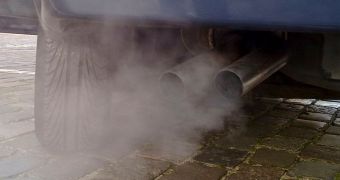During a study conducted on the brains of lab mice, scientists at the Duke University discovered that intrauterine exposure to compounds in diesel exhaust fumes represents a risk factor for obesity.
The team discovered that this led to inflammation in the brains of fetuses, and also to an increased level of immune activity in areas controlling metabolic activity. This illustrates a potential link to weight gain and fat storage, the group explains.
Details of the new investigation were published in the latest issue of the FASEB (Federation of American Societies for Experimental Biology) Journal. While mothers were not critically affected by exposure, their offspring appeared to be a lot more likely to become obese later on in life.
At the same time, scientists found a higher risk of the baby mice developing insulin resistance as they grew up. This may very well set the stage for the onset of diabetes, the investigators go on to explain.
An interesting observation was that male mice appeared to be most affected by their mothers' exposure to air pollution. Regardless of the diet they followed after birth, male offspring were heavier than females. The exact reasons for this have not yet been clearly established.
“It is becoming clearer that our environment profoundly affects our health in ways that are little understood,” research scientist Jessica L. Bolton, PhD, explains. She is based at the Duke Department of Psychology and Neuroscience, in Durham, NC.
“We believe these data have important implications for health disparities as a consequence of socioeconomic conditions, in which low income neighborhoods tend to be disproportionately exposed to high levels of pollution, which we hope will inform policy and regulation decisions,” she adds.
While studies that validate the same link still need to be conducted on humans, researchers say that it wouldn't hurt for pregnant women to take these discoveries into account in their daily lives.
“If you're pregnant and have a long drive into work, you might think twice about opening the car windows,” says the Editor-in-Chief of the FASEB Journal, Gerald Weissmann, MD, quoted by EurekAlert.
Exposure to pollution has already been demonstrated to produce significant health effects, such as exacerbating respiratory diseases including asthma. Air contaminants have also been shown to turn tree leaves magnetic, through the exact reason why this happens has yet to be determined.

 14 DAY TRIAL //
14 DAY TRIAL //